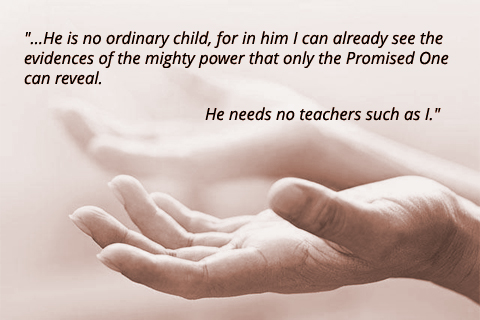|
 PART
TWO
April
30, 2019
I
AM TWO YEARS YOUNGER THAN MY LORD [1]
PART
TWO
April
30, 2019
I
AM TWO YEARS YOUNGER THAN MY LORD [1]
When the headmaster finally caught sight of Siyyid ‘Alí-Muhammad
reciting prayers behind the school, he was determined to interrupt Him
and punish Him for not returning to class in time. However, so
beautiful was the sight of this small child – the sweetness and utter
devotion in His expression, His face lifted heavenward and bathed in
light – that he was utterly spellbound. At last the child bent his
forehead to the ground in a final reverence. After a moment’s
hesitation, the headmaster finally approached the boy – no longer with
anger, but with awe. “Siyyid ‘Alí-Muhammad! To whom were you praying
with such fervor?” he inquired with a wink of humour and a slight
unsteadiness in his voice. “To my grandfather,” replied the boy, very
calmly. He meant, of course, the Prophet Muhammad.
 Siyyid ‘Alí Muhammad’s gift for prayer would move many people whose
spiritual eyes and ears were receptive. All people are born with gifts
of some sort – some create paintings that stir the imagination; some
play music or dance beautifully or discover distant planets or
invisible particles. Siyyid ‘Alí Muhammad had the rarest of gifts,
however, which was a soul so clear and pure and a love for God so great
that when he prayed it was as though you could see God moving within
him like a great white whale leaping majestically in shimmering emerald
waters, or like a huge orange sun rising from the centre of his being.
Siyyid ‘Alí Muhammad’s gift for prayer would move many people whose
spiritual eyes and ears were receptive. All people are born with gifts
of some sort – some create paintings that stir the imagination; some
play music or dance beautifully or discover distant planets or
invisible particles. Siyyid ‘Alí Muhammad had the rarest of gifts,
however, which was a soul so clear and pure and a love for God so great
that when he prayed it was as though you could see God moving within
him like a great white whale leaping majestically in shimmering emerald
waters, or like a huge orange sun rising from the centre of his being.
The headmaster, Shaykh ‘Ábid, did not know what to do with his
brilliant student. At every moment the wisdom of this seven-year-old
child declared his own ignorance. At every opportunity, this boy showed
an understanding of the Qu’rán far beyond his own.
Therefore, he
decided to return the boy to his home and confess his inability to
adequately teach him.
Hají Mirzá Siyyid ‘Alí was the boy’s maternal uncle and legal guardian
to both his sister and the boy since his father’s death. He was not
pleased to see the headmaster arrive with his nephew. Now what has he
done? he thought. It was not that Siyyid ‘Alí-Muhammad was ever a bad
boy. It was rather that he was different. From the moment of his birth
in the southwestern Iranian city of Shíraz as dawned peeked over the
earth on October 20, 1819, he rarely cried, played very quietly and was
always even-tempered. When he spoke, he would say the most amazing
things. His uncle witnessed how people were drawn to the little boy.
“I have brought him to you,” said Shaykh ‘Ábid, “and commit him to your
protection. He is no ordinary child, for in him I can already see the
evidences of the mighty power that only the Promised One can reveal. He
needs no teachers such as I.”
“Have you forgotten my instructions?” his uncle demanded. “Did I not
ask you to follow the example of your schoolmaster, observe silence and
listen carefully to your teacher’s every word?

Nevertheless, the boy returned to the school and when he was 17 years
old, his uncle, who was a merchant, sent him to the port city of
Búshihr to open a shop. Because he was a descendant of the Prophet
Muhammad, he wore a green turban and a green sash as a symbol of his
lineage. The merchant business soon thrived. Siyyid ‘Alí Muhammad had a
reputation for honesty and integrity, and people were attracted to his
deep, devotional character. People who witnessed him praying in the
mosque were sometimes moved to tears. In 1842, when he was 22 years
old, Siyyid ‘Alí Muhammad returned to Shíraz to marry Khadijih Bagum.
Khadijih Bagum and Siyyid ‘Alí Muhammad were cousins and neighbours who
grew up together. When her cousin left for Búshihr, she dreamt she saw
him standing in a field of beautiful flowers. He was facing Mecca and
wore a coat whose lapels were richly embroidered with verses from the
Qu’rán. His face was shining like the noonday
sun. Not long after their
marriage, she soon discovered she was pregnant. When the time came to
give birth, however, there were complications that threatened both her
life and that of the child. His mother begged him to save them, so he
gave her a prayer written on a mirror to be placed before his wife.
Their son was safely delivered but died soon afterwards. His mother
could not understand how he had such power but could not save his son.
Although Siyyid ‘Alí-Muhammad was saddened, he replied that he was not
destined to have a child.
Khadijih Bagum received another shock as well, one that would change
her life forever. One night, her husband arose from their bed and left
the room. She thought nothing of it until his absence lengthened to
more than an hour. Overcome with curiosity, she saw a light in the
chamber on the second floor and decided to climb the stairs to see,
although with every step she felt a growing anxiety. When she reached
the top, she saw her husband standing in the centre of the room, arms
lifted upward, His face streaming with tears, chanting prayers in a
beautiful voice. His face radiated light that deflected off the stain
glass windows, turning them into jewels that blurred her vision.
Trembling and glued to the floor in fear, she could not move. Siyyid
‘Alí-Muhammad then made a brief movement of his hand which released
her. She flew down the stairs back to their bedroom.
The next morning, she dreaded meeting her husband and shrank away from
him when he sat with her at breakfast. He asked her why she looked so
anxious. “O my husband! It is the change in you that weighs upon my
mind. We have known each other since childhood, we have been married
and living in this house these past two years, but now I see a
different person before me. You have been transformed, and this makes
me anxious and uneasy.” Her husband smiled.
“It was not my desire that you see me last night, but the Will of God
that decreed it so that no shadow of a doubt should ever cross your
mind. You should come to know with absolute certainty that I am that
Manifestation of God Whose advent has been expected for a thousand
years. This light radiates from My heart and My being.”
As soon as Khadijih Bagum heard these words, she did not hesitate. She
knelt at his feet, her heart now calm and assured, and promised to
serve Him all the days of her life, which she did with absolute
humility and steadfastness.
[1] Islamic hadith
(saying) attributed to the Imam ‘Alí, which gives a clue as to when the
promised One would be born. The Báb was born in 1819 and Bahá’u’lláh in
1817.
|
|


